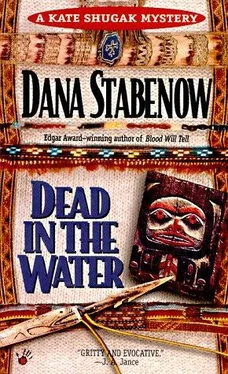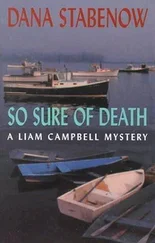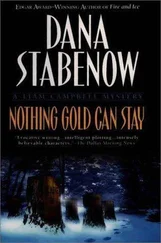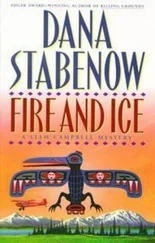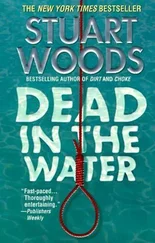Dana Stabenow - Dead in the Water
Здесь есть возможность читать онлайн «Dana Stabenow - Dead in the Water» весь текст электронной книги совершенно бесплатно (целиком полную версию без сокращений). В некоторых случаях можно слушать аудио, скачать через торрент в формате fb2 и присутствует краткое содержание. Жанр: Детектив, на английском языке. Описание произведения, (предисловие) а так же отзывы посетителей доступны на портале библиотеки ЛибКат.
- Название:Dead in the Water
- Автор:
- Жанр:
- Год:неизвестен
- ISBN:нет данных
- Рейтинг книги:4 / 5. Голосов: 1
-
Избранное:Добавить в избранное
- Отзывы:
-
Ваша оценка:
- 80
- 1
- 2
- 3
- 4
- 5
Dead in the Water: краткое содержание, описание и аннотация
Предлагаем к чтению аннотацию, описание, краткое содержание или предисловие (зависит от того, что написал сам автор книги «Dead in the Water»). Если вы не нашли необходимую информацию о книге — напишите в комментариях, мы постараемся отыскать её.
Dead in the Water — читать онлайн бесплатно полную книгу (весь текст) целиком
Ниже представлен текст книги, разбитый по страницам. Система сохранения места последней прочитанной страницы, позволяет с удобством читать онлайн бесплатно книгу «Dead in the Water», без необходимости каждый раз заново искать на чём Вы остановились. Поставьте закладку, и сможете в любой момент перейти на страницу, на которой закончили чтение.
Интервал:
Закладка:
" 'Doughnut hole'?"
Kate gestured in the general direction of the North Pacific Ocean. "Starts around the Pribilof Islands and ends, I don't know, somewhere off the Kamchatka Peninsula. Sort of an international free-for-all area for fishermen from all over."
"Beyond the two-hundred-mile limit," he suggested.
"Way beyond," Kate agreed. "The U.S. and Russia and Korea and Taiwan and Japan have been fighting in the U.N. for years for the rights to fish there. The nations have, anyway. The fishermen just fish, most of them with drift nets that drag the sea bottom and pull up everything that gets in the way. Which the biologists figure is why the crab stocks took such a dive in the mid-eighties."
Jack examined his greasy fingers with rapt attention before beginning to clean them with his napkin, slowly, meticulously, one at a time. "Listen, Kate," he said to his left ring finger, "I don't mean to sound like some nervous granny here, and I trust you to take care of yourself or I would never have set you up in this job, but-" He looked up and caught her eye, very serious. "There are survival suits on board the Avilda, aren't there?"
She gave him a thin smile. "First thing I checked."
"Got one for everybody?" She nodded. "They all in working order?"
She nodded again. "Unlike the Avilda."
"And life rafts?"
He knew how many life rafts there were from the reports on Alcala and Brown's disappearance, but she answered him patiently. "Two, mounted on the roof, one port, one starboard."
"Good. Not that I'm anxious about you or anything."
"Of course not," Kate agreed, still patient. The male instinct to protect was as irritating as it was infrequently endearing, but there was nothing to be done but wait until it had run its course. Probably had something to do with testosterone. There ought to be a test, like one of those early pregnancy tests, only this would be an early testosterone test to detect large buildups of testosterone in male children. They could tattoo the results on every male child's forehead; that way, unsuspecting females could tell at a glance how deep the waters were around this particular island of manly pride. She looked across the table measuringly. It was an idea whose time had come.
Jack, unsuspecting, mopped up the rest of his ketchup with his last remaining fry, regarded it sadly and swallowed it regretfully. "Nothing like a grease-soaked french fry to start your day off right," he observed. Tapping the notes she had given him, he said, "I'll call town and have someone start checking on Harley Gruber and Henderson Gantry."
"Five'll get you ten Gruber, Gantry and Gault are one and the same."
"No bet." He tried out one of his better leers. "Care to join me? I won't be on the phone that long."
"You find a room?" she said, surprised. "I can't believe the state is going to pay for any more three-hundred-dollar nights in the Shipwreck."
He hooked a thumb in the general direction of the harbor.
"I talked one of the processors out of a bunk. More like a little apartment, actually. Manager's on vacation. Come with?"
"Where is it?" He told her and she rose to her feet.
"I'll be down later. This might be my only chance to get to Unalaska. I'd like to see what it looks like."
Amaknak Island was connected to Unalaska Island by a five-hundred-foot bridge, the Bridge to the Other Side.
Less than a mile beyond that bridge was the village of Unalaska, a town of less traffic and more village than Dutch Harbor.
Unalaska occupied a special place in Alaskan history.
The Russians came there, centuries before, for the same reason the crab fishermen were there now, and the military during World War II, and that was because it had the best natural harbor in a thousand miles of Aleutian Islands. But the Aleuts had been there before them all, rich in culture and natural resources, earning a living from a bountiful if harsh marine environment, eventually sitting ducks for civilization in the form of the Russian Orthodox religion, the company store and the clap. Dragooned into slaughtering seals and sea otters almost to the point of extinction to supply the Asian fur trade, the Aleuts fought back, only to be quashed by superior firepower. The fur market collapsed, Alaska was sold to the United States and Russian traders gave way to New England whalers, the whalers to gold prospectors, the prospectors to the United States military. And now this latest invasion: fishermen and processors, American, Korean, Japanese, Russian, Taiwanese, literally scraping the bottom of the North Pacific Ocean to feed the world's insatiable appetite for seafood.
The road topped a little rise between two small hills and the rooftops of the village came into view. It wasn't much more than a string of buildings lined up along the water, enclosed by one gravel road that ran down the beach and a second that ran down the side of the truncated river that drained Unalaska Lake into Iliuliuk Bay.
The buildings were a colorful jumble of frame houses, trailers and World War II-vintage cottages and cabanas, one and two stories high, some old and weathered gray by wind and salt spray, some new with the unmistakable mark of Outside prefabrication stamped firmly upon them. It reminded Kate of Niniltna, both in location and construction. She saw orange fluorescent buoys offshore, probably mooring buoys for the villagers' boats. There was an old clapboard church with two cupolas, each with onion domes surmounted by the distinctive Russian Orthodox crosses with the slanted foot bar that Christ was supposed to have twisted in his agony during the Crucifixion.
The beach was a narrow strip of gray sand, and Kate, always a sucker for beaches, walked around the end of the village, through the tall grass poking up through the crusted snow, and down to the wet sand separating sod and tide. The fog swirled overhead and offshore, and although she could hear Dutch Harbor going energetically about its business less than half a mile away across the water, the noise seemed muted. The beach stretched out before her, and she began to walk. A big New England dory loomed up out of the fog and grated against the gravel. Kate caught the bow and tugged it farther up the beach. The dory's owner hopped out and nodded his thanks. Kate walked on and the fog swallowed him up again. Farther down the beach two more figures resolved from shadow to solid shape, a father instructing his young, solemn son in the art of mending nets. The needle in his gnarled hands stilled and they looked at her without speaking until she moved on.
Wavelets from the wakes of passing boats lapped at the shore. The fog felt coot and misty on her cheeks.
Because it obscured her vision, her ears worked overtime and she heard them long before she saw them. A group of girls squatted in a circle at the edge of the water, where the sand was wettest. Soft-footed, Kate came up behind them and paused to look over their shoulders.
One of the girls' legs was twisted beneath her at an awkward angle. Her body was bulky, her head too small for it. Her nose seemed to have no bridge, only nostrils, and she wheezed a little when she breathed through it.
She was speaking, and at first Kate thought she must be speaking in Aleut, and then realized that the girl must have a cleft palate. She wasn't the only one who couldn't understand her because the girl next to her translated.
"Gakgak," said the girl with the twisted leg. "Kayak," the girl next to her repeated. "Kayak. Thunderbird.
Men. Do the men come in the kayak or the thunderbird, Sasha?"
"Kayak," Sasha replied. "Men. Thunderbird. Men."
"What's this?" another girl asked.
"It looks like 'home,' " another girl said, puzzled.
"I guess I'm dumb, Sasha," the first girl said apologetically.
"I don't get it. Is this a new story?"
Читать дальшеИнтервал:
Закладка:
Похожие книги на «Dead in the Water»
Представляем Вашему вниманию похожие книги на «Dead in the Water» списком для выбора. Мы отобрали схожую по названию и смыслу литературу в надежде предоставить читателям больше вариантов отыскать новые, интересные, ещё непрочитанные произведения.
Обсуждение, отзывы о книге «Dead in the Water» и просто собственные мнения читателей. Оставьте ваши комментарии, напишите, что Вы думаете о произведении, его смысле или главных героях. Укажите что конкретно понравилось, а что нет, и почему Вы так считаете.
